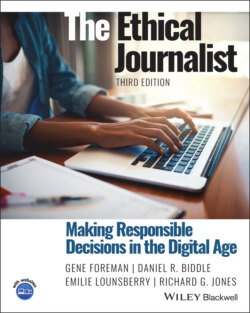Читать книгу The Ethical Journalist - Gene Foreman - Страница 56
Giving media access to criminals
ОглавлениеEven so, when law enforcement asks for help, the choice can be difficult. Journalists at KKTV in Colorado Springs, Colorado, helped authorities in January 2001 because they thought their cooperation could defuse a threat of lethal violence.
Two heavily armed Texas prison escapees were holed up in a Colorado Springs hotel room. They told negotiators they would surrender if they could be interviewed on live television and were allowed to vent their complaints about the Texas prison system. The negotiators agreed to ask the station to give them five minutes each.
The station went along, and the interviews were carried live with the video showing anchor Eric Singer at a desk talking with the men on a telephone. Singer allowed them to make opening statements and then asked questions. An FBI agent sat off‐camera and kept time. 13
Singer said that, before the interviews began, he briefed officers on the questions he planned to ask. He said he agreed to “stay away from hot‐button words,” so he did not ask the fugitives what happened when they allegedly shot a police officer in Texas. The limitations on his interview did not disturb Singer. In his experience, he said, it is not uncommon for people being interviewed to “dictate how they want it done.” He said interview subjects frequently specify “what questions will be on or off limits.”
Singer said the viewers were told what was happening before the interviews were aired. Afterward, he said, the station made sure that the viewers “were clear about the questions that I came up with and the ones that weren’t asked. … There was nothing hidden.”14 After the interviews, at about 3:45 a.m., the fugitives surrendered.15
Singer expressed satisfaction with the station’s role in the event. “We are in the business to know things and report on them,” he said. “These two men were the hottest stories of the day. We got to interview them and also helped keep the community safe.”16
The episode ended well, but ethical questions remain – questions that other broadcasters should consider before they face similar requests.
The situation faced by the Colorado Springs station replicated the issues that the publishers of The New York Times and The Washington Post faced in 1995. A person known only as the Unabomber had been mailing bombs that in the previous 17 years had killed three people and injured 23. Now he demanded that the two newspapers publish his 35,000‐word manifesto denouncing “the industrial system” and advocating a revolution to wreck that system. If the publishers refused, he wrote, he would resume bombing.
The newspapers complied, even though some in journalism warned that they were setting a precedent and leaving the media open to further blackmail. “You print and he doesn’t kill anybody else, that’s a pretty good deal,” Times publisher Arthur Sulzberger Jr. said in a message to his staff. “You print it, and he continues to kill people, what have you lost? The cost of newsprint?”
The publication of the manifesto led to the arrest and conviction of Theodore Kaczynski, the Unabomber. His brother David recognized the writing style and informed authorities, who tracked down Theodore Kaczynski in a mountain cabin in Montana. 17
